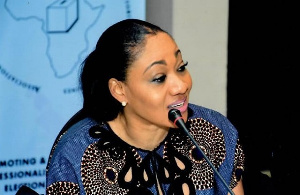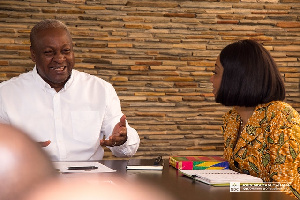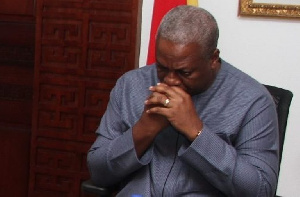No fraud in EC tender – Jean Mensa

The Electoral Commission (EC) has ruled out any unfair practices in the award of contracts for the procurement of electoral materials for the election 2020.
Having failed to convince the EC to use the old voters’ register for election 2020, the forces against the new register are re-strategising, raising issues of procurement.
According to Imani Ghana boss, Franklin Cudjoe, EC’s recent procurement process for the selection of vendors for the Biometric Voter Management Solution (BVMS) is fraught with irregularities, claiming that Commission was going to pay for more contrary to earlier position that money would be saved.
“But economic cost is not the only thing to be worried about. The EC also bungled the procurement process, leaving a trail of evidence suggesting tender-rigging. This has opened the process to litigation and delay,” Franklin Cudjoe claimed.
However, EC sources said the procurement process was above board, having gone through Public Procurement Authority (PPA) and the Central Tender Review Committee (CTRC) for the approval of the Commission’s tendering process.
According to EC sources, all the four companies shortlisted demonstrated their technical capabilities openly, and that the vendor with competitive price was selected for the building of the data centre as well as the supply of biometric materials, adding that the credibility of the election is their main focus.
The EC sources indicated that during the evaluation process, anomalies were detected and with suggestion from PPA and CTRC, corrections were effected, dismissing any ‘kululu’ in the tendering process.
The EC would be saving not over GH¢173 million on a new register compared to refurbishing or upgrading the BVMS supplied by STL.
About $74,364,500 was requested by the vendor for refurbishing the old BVMS supplied as against procuring new BVMS for 2020 at a total cost of $56,000,000, saving $18,364,500 or GH¢104,677,650.
With the upgrade of the data centre with one-year maintenance cost, the EC would spend not less than $19,000,000, whereas to acquire a new upgraded data centre with three years maintenance cost is $7,000,000. The EC is, therefore, saving $12 million, amounting to GH¢68.5 million on the data centre.
This brings total savings to GH¢173,077, 650 as against refurbishing the old system.
April Registration
The Commission is embarking on the compilation of the new register from April 18 to May 30.
But the forces against the new register led by the main opposition National Democratic Congress (NDC) insist that the old register is their best bet for the election 2020— anything less is doom for the country.
Nana on Register
President Akufo-Addo, who is currently in Norway, said in Oslo on Monday that the decision to compile a new voters’ register “makes a lot of sense.”’
The President stated that it is prudent for the EC to compile a new register every eight years as it has been doing in the past.
Speaking at a meeting with the Ghanaian community, the President said, “We are getting ourselves ready for December 7. The Electoral Commission is going to compile a new register. It appears there is now an eight-year cycle for the EC to compile a register. They did so in 2012 and 2004. So with these last three, including this one, are all in the eight-year cycle. I think it makes a lot of sense. The national census itself is done on a ten-year basis.”
The EC had taken a decision on June 12, 2019 to replace the BVMS which had been used by the Commission since 2012 based on the advice by a biometric technology consultant.
The consultant, who had advised the EC in 2011, when the commission took the decision to go biometric, came with the advice that the EC should jettison the old BVMS and go for the latest system which is cost-effective and technically robust.
“The expert’s main task under the 2019 consultancy was to review Super Tech Limited’s (STL) technical and financial proposals for the upgrade and refurbishment of the existing toolset and data centres as well as audit and assess the existing Biometric Voter Management System,” the source said.
The consultant’s verdict was that the biometric toolset currently in use is obsolete and has reached its end of life.
It added that cost of maintenance and refurbishment of the toolset have reached unsustainable levels and that the cost of procuring a new advanced biometric technology would be more economical than refurbishing and upgrading of the current toolset supplied by STL.
With this advice, the EC did not hesitate in striking out $56million contract awarded to STL by the previous managers for the refurbishment of the biometric materials for the 2018 referendum for the creation of new regions.
Previous Figures
Interestingly, figures emerging from the previous registration for the 2016 elections supervised by the deposed managers of the electoral system showed huge budget compared to the 2020 budget.
In 2012, the new voters’ register cost the Commission GH¢ 169,730,146. The 2014/2015 limited registration exercise for the district level elections cost GH¢287,559.379.
In 2016, the limited registration exercise for 800,000 potential voters cost GH¢ 487,998,714 while compilation of new a voters’ register for over 16 million potential voters in 2020 is estimated to cost GH¢390,265,186.44.
Source: Dailyguidenetwork.com





